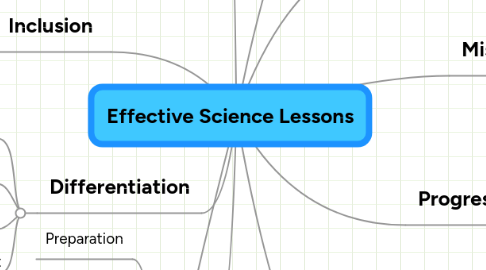Effective Science Lessons
by Hannah Martin


1. Organisation
1.1. Preparation
1.2. Planning
1.3. Classroom
1.4. Clear structure
1.4.1. objective led
1.4.2. minimum of 3 parts
1.4.2.1. Starter
1.4.2.1.1. Short and engaging
1.4.2.2. Main
1.4.2.2.1. Short introduction
1.4.2.2.2. Chunked into short activities
1.4.2.3. Plenary
1.4.2.3.1. Summarise learning
1.4.2.3.2. Part of AfL
1.4.2.3.3. Mini plenaries, not just at end of lesson
1.5. Consistency
1.6. good content
2. Assessment
2.1. Formative
2.1.1. APP
2.1.1.1. Evidence of pupil proression
2.1.2. AfL
2.1.2.1. Peer & self assessment
2.1.2.2. Modify mid lesson
2.1.2.3. Planning for progression
2.2. Summative
2.2.1. AoL
2.2.1.1. League Tables
2.2.1.2. Informing Parents & Public
2.2.1.3. Evidence of progression
3. Differentiation
3.1. Special Educational Needs
3.2. Gifted/Able and Talented
3.3. Vulnerable students
3.3.1. Frequently changing
3.4. Appropriate work for all
4. Inclusion
4.1. For all abilities
4.2. For all cultural differences
4.3. Diversity
5. Directed Study
5.1. Homework - set
5.2. Personal study - interest
6. Motivation
6.1. student self/intrinsic
6.2. student extrinsic
6.3. engaging activities
6.4. the big picture
6.4.1. the point? How science works
6.5. Rewards
6.6. Praise
7. Learning Styles
7.1. VAK
7.2. Varied activities to suit
7.2.1. short & engaging
7.3. varied methods of delivery
7.4. engaging
8. Misconceptions
8.1. already held
8.2. created by topic
8.3. dealing with them
9. Behaviour Management
9.1. Consistent
9.2. Obvious Boundaries
9.3. Sanctions
9.4. Effect on whole class
10. Progression
10.1. Building on prior knowledge
10.1.1. from KS2
10.1.2. acquired, not formally taught
10.2. Based on Targets
10.2.1. FFT
10.2.2. School based
10.3. Feed forward
10.3.1. where should the learning go next?
